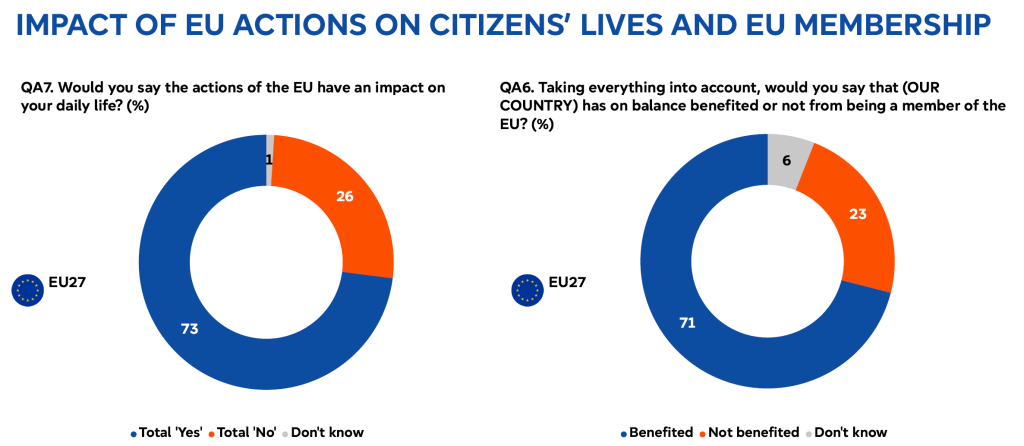
As the June 2024 European Parliament elections approach, the latest Eurobarometer survey report analyzed by Yuliia Ovchar, a Political Affairs Trainee at the Council of Europe Liaison Office to the EU, provides useful insights into the evolving sentiments of European voters.
This report, conducted by Verian (formerly Kantar) in February across all EU Member States through over 26,000 face-to-face interviews, reflects a significant upward trend in electoral engagement driven by current geopolitical tensions, notably Russia’s aggression against Ukraine.
According to the survey results highlighted in Ovchar’s report, a compelling 81% of Europeans now believe that participating in the upcoming elections is more important than ever.

This heightened sense of urgency is complemented by an increased readiness to vote, with 71% of respondents indicating their likelihood to cast their ballots.
These findings not only indicate a growing political awareness but also an engaged electorate poised to influence the future trajectory of the European Union.
The survey delves deeper into the electorate’s priorities, revealing that 33% of respondents are most concerned with the fight against poverty and social exclusion, closely followed by public health support, which garners the attention of 32% of the populace.

These issues, coupled with the rising significance of EU defense and security—a response no doubt accentuated by the security dilemmas on the continent—sketch the primary contours of what might shape the electoral debates and campaigns.
Roberta Metsola, the President of the European Parliament, has echoed this sentiment, urging EU citizens to participate actively in the forthcoming elections to “strengthen European democracy and shape the future of Europe.” Her call to action underscores the critical role that voter turnout will play in defining the union’s response to both internal and external challenges.
The increase in electoral indicators such as interest in the elections, knowledge of the voting date, and the likelihood of voting participation, as noted from a previous survey in autumn 2023 to the current findings, suggest a more informed and motivated electorate. This shift is pivotal, considering the impact that an engaged voter base can have on the legitimacy and efficacy of the European Parliament’s decisions.
This survey report by Yuliia Ovchar not only sheds light on the shifting dynamics of voter engagement but also serves as a barometer for the issues that are most likely to influence voter turnout and election outcomes. The emphasis on social welfare, public health, and security concerns indicates a populace that is both aware and anxious about the future of their continent in these tumultuous times.
As the EU navigates these complex geopolitical waters, the 2024 elections will be a crucial test of its democratic resilience and the collective will of its people. The report’s findings suggest that Europeans are increasingly ready to take on this responsibility, making the forthcoming elections a potentially transformative moment for the union.
In conclusion, Yuliia Ovchar’s analysis of the Eurobarometer survey underscores an essential truth: voting is not merely a right but a powerful tool for shaping the future.
As we move closer to the 2024 European Parliament elections, it is clear that Europeans are not only ready to vote but are also eager to influence the critical decisions that lie ahead. This heightened engagement is a positive sign for the health and future of European democracy.





